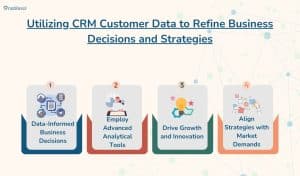Similar to capital in conventional business settings, client data is the driving force behind corporate success in today’s age. Data management for CRM needs to be done well for businesses to use data-driven strategies and decisions in addition to improving customer satisfaction. This comprehensive manual explores the fundamentals of CRM data management and provides firms with tactical approaches to strengthen their position in the market and make wise, well-informed decisions.
Collecting and Organizing Customer Data for Effective CRM
Efficient data management for CRM begins with meticulous collection and organization. Here’s a structured approach divided into five crucial steps:
Employ Robust CRM Data Migration Technologies:Use innovative CRM data migration tools to ensure that client data is seamlessly transferred from legacy systems to new platforms without loss or damage.
Carefully Plan Your Data Migration: Create a thorough data migration strategy to ensure accurate process management. Data management for CRM is optimized when all client data is moved and operationally functioning in the new system, which is ensured by careful preparation.
Establish Structured Data Collection Frameworks: Develop uniform frameworks for gathering data to ensure process uniformity at all client contact points. As a result, future data management chores within CRM systems will be made simpler and the data acquired will be consistent.
Ensure Data Accessibility: Arrange information so that it can be quickly accessed and retrieved. This will help you make decisions more quickly and will improve the way your CRM uses and analyzes data.
Refresh and Validate Data Regularly: To keep data accurate and relevant, update and validate it frequently. This procedure is essential for cutting down on errors and guaranteeing that the data forms a solid basis for wise business judgments.
Ensuring Data Accuracy and Security in CRM
In the realm of data management for CRM, accuracy and security are paramount:
Data Accuracy: To guarantee data integrity, do regular enhancements and audits. Precise data is essential because imprecise data might result in erroneous plans that could be harmful to the company.
Data Security:Take strict security precautions to safeguard private client data that is gathered and kept in your CRM. This process, safe data storage methods, and adherence to privacy laws are some ways to increase trust and credibility in your CRM consulting services.
Leveraging Data Analysis and Segmentation in CRM for Targeted Marketing and Sales Efforts
Key elements of data management for CRM include data analysis and segmentation, which allow for more targeted marketing and sales strategies:
Conduct Detailed Data Analysis: Organize and accurately source data to conduct in-depth data analysis to spot patterns and trends. Making wise decisions that improve data management for CRM requires this strategic knowledge.
Segment the Customer Base: Segment your customers into more manageable, smaller groups based on shared attributes like buying patterns or demographics. Knowing various client wants and preferences is made easier with the help of this segmentation.
Develop Targeted Marketing Strategies: Make marketing strategies more relevant and engaging by adjusting them to the unique requirements of each consumer category found through CRM data analysis.
Enhance Sales Tactics: Adapt sales tactics based on information gleaned from data analysis and segmentation. The correct goods and services are provided to the right clients at the right time when data management for CRM is done well.
Boost Conversion Rates: Businesses can expand market penetration and obtain significant increases in conversion rates by concentrating marketing and sales efforts on well-defined categories.
Personalization and Customization: The Pinnacles of CRM Data Management
In CRM, personalization is a potent use of customer data. Corporations may improve customer satisfaction and loyalty by personalizing their interactions to each customer’s demands by maintaining full awareness of their preferences and behaviors. Custom messages and tailored product suggestions are just two examples of how important data management is for CRM.
Businesses could gather a multitude of data points from different consumer engagements, such as direct transactions, online browsing habits, or social media engagement, by implementing effective data management for CRM. Businesses can create a thorough profile for each consumer by combining and analyzing this data. Along with more detailed details like purchase history, preferred communication channels, and even the periods when customers are most inclined to interact, this profile also contains basic demographic data.
Customizing a conversation for every customer is the essence of CRM personalization. Robust data management has enabled a comprehensive understanding of their preferences and habits, which is the basis of this conversation. By doing this, businesses may provide services that seem unique and well-considered, strengthening their bond with clients. Personalization is an essential part of the toolset of contemporary CRM tactics since it not only generates instant sales but also lays the groundwork for sustained engagement and loyalty.
Utilizing CRM Customer Data to Refine Business Decisions and Strategies
Strategic utilization of customer data within CRM involves:

Data-Informed Business Decisions: Use strategic customer data analysis to make key business decisions about new product development, marketing strategies, and customer service enhancements.
Employ Advanced Analytical Tools:CRM consulting services may offer sophisticated analytical tools that help interpret complex datasets, providing actionable insights that influence decision-making processes.
Drive Growth and Innovation: Utilize insights from extensive data analysis to identify opportunities for business innovation and expansion. Effective data management for CRM supports entering new markets, launching new products, or improving existing services.
Align Strategies with Market Demands: Ensure that business strategies are in sync with current consumer needs and market trends. This alignment is essential for maintaining competitiveness and adaptability in an evolving market.
The Role of CRM Consulting in Data Management for CRM
Effective data management is the backbone of successful CRM implementations, enabling businesses to harness the full potential of customer data for strategic decision-making and enhanced customer experiences. CRM consulting services play a pivotal role in guiding firms through the complexities of data management within CRM systems. Here’s how CRM consulting can elevate data management practices:
1. Strategic Planning for Data Migration:
CRM consultants facilitate seamless data migration from legacy systems to modern CRM platforms using advanced migration tools. They develop comprehensive migration strategies that ensure data integrity and minimize disruption to operations. Strategic planning is crucial to ensure all client data is accurately transferred and operational in the new CRM system.
2. Customization and Integration:
Consultants tailor CRM solutions to align with specific business processes and objectives. They integrate CRM systems with existing tools such as accounting software and document management systems, streamlining data flow and enhancing operational efficiency. Customization ensures that the CRM system meets the unique needs of the business, optimizing data accessibility and usability.
3. Data Quality Management:
Maintaining data accuracy and consistency is essential for effective CRM operations. CRM consultants implement robust data quality management strategies, including regular data cleansing and validation processes. This ensures that CRM data remains reliable and up-to-date, minimizing errors and supporting informed decision-making.
4. Security and Compliance:
CRM consulting services prioritize data security and regulatory compliance. Consultants implement stringent security measures to protect sensitive client information stored within CRM systems. They ensure adherence to data privacy laws and industry regulations, fostering trust and credibility among clients and stakeholders.
Conclusion: The Imperative of Mastering Data Management for CRM
Understanding data management for CRM in today’s ever-changing digital environment is not just an advantage in strategy. It’s also a basic requirement for any company hoping to survive and stay relevant. Good CRM data management provides a solid foundation. Companies need to develop complex plans, hone their operational procedures, and eventually take the lead in a industry. The capacity to effectively handle and utilize consumer information becomes essential as customer demands increase and data complexity rises.
Organizations may convert unstructured and fragmented data into useful insights by strategically investing in data management for CRM. These insights enable organizations to anticipate market trends, customize consumer experiences, and make well-informed decisions, all of which promote long-term growth and a competitive edge. Strong data management processes also guarantee data confidentiality and accuracy, maintaining consumer confidence and meeting strict legal standards.
Through the adoption of a comprehensive strategy for CRM data management, businesses may efficiently leverage data to stimulate creativity and adaptability. This entails using sophisticated analytical tools to unearth profound insights. Implements focused marketing techniques to improve consumer interaction and upgrade and safeguard databases regularly to preserve data integrity. Businesses may increase conversion rates, maximize sales efforts, and get a better return on investment through using these strategies.
In the end, a key factor in both long-term corporate performance and consumer happiness is CRM data management expertise. It makes it possible for businesses to be flexible in a market that is constantly changing. And also to create strong connections with clients through meaningful and customized interactions. Therefore, any company that wants to achieve excellence and leadership in its market must adopt strategic, all-encompassing data management processes. These practices are not only advantageous but also necessary.



